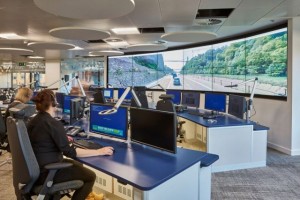Collaboration between Bristol’s tech sector, council and academia has helped it overtake London as the UK’s leading smart city, according to a new index.
Navigant Consulting, which was commissioned by Huawei UK to produce the second UK Smart Cities Index, said Bristol’s success was a direct result of it taking significant strides to extend its innovation programmes and more closely integrate those initiatives into city strategy. 
It pointed to the Bristol Is Open project, the joint venture between the University of Bristol and the city council, and which provides a large-scale connectivity test bed. It also said Bristol led in the areas of data access, energy innovation and community engagement.
Bristol’s new City Operations Centre, which opened two weeks ago, is seen as an example of the city’s innovation and collaboration.
It brings together and integrates the council’s emergency control centre, traffic control centre and community safety (CCTV) control rooms for the first time along with other citizen service providers. It also provides services such as telecare, alarm and security monitoring and lone worker support with almost 60,000 welfare and telecare calls received every month.
Cabinet Office Emergency Planning College head of exercising Andrew Everitt praised the new Operations Centre. He said: “The new operations centre in Bristol is world class and provides an enviable facility for diverse responder organisations to work together in managing all types of incidents and events, from response to recovery.”
The report also singled out Bristol for community engagement, including the citizen sensing strategy developed by Knowle West Media Centre. This is designed to allow people to build or use sensors to tackle issues that are important to them, including the use of sensors in the Damp Busters pilot initiative to gather data about the problem of damp in homes. 
The Huawei UK Smart Cities Index rankings were calculated by an in-depth analysis of 10 criteria within the cities’ strategy and execution, covering areas such as their vision, digital innovation, implementation record, environmental impact and community reach.
The report is based on evaluations of 20 cities and their strategies, key projects and overall readiness in using digital technology to improve crucial civic services from transport infrastructure to healthcare.
Bristol Is Open managing director Julie Snell said: “Cities the world over must look to technology to address the way they manage their resources and infrastructure to deliver innovative services for citizens and businesses.
“Bristol has shown leadership in bringing together industry, government, academia and citizens to form a collaborative platform for the development of its smart cities program. Being recognised in the Huawei UK Smart Cities Index as the city that has made the most significant growth in its smart city program is testament to the vision and support of Bristol City Council, the fantastic results for the University of Bristol research and development department and the very many other players in the city who all contribute to Bristol Smart City.”
Deputy Mayor Cllr Craig Cheney added: “Bristol is well and truly forging ahead in developing smart city technologies which was strengthened by the opening of the Smart City Operations Centre.
“The state-of-the-art centre integrates several of the council’s key services and links into the city’s high-speed fibre network through Bristol Is Open. I’m very pleased that Bristol has been acknowledged this way and we will continue to work towards developing our smart city capabilities in order to improve services for our residents and visitors.”
University of Bristol pro vice-chancellor for research Prof Nishan Canagarajah said Bristol’s top ranking was testament to the scientific talent at the university and collaborative partners in the city.
These were pioneering innovative smart city optics, networks and wireless technologies that will not only address the UK’s future societal challenges but will ultimately make Bristol an even better place to live.
Bristol and London were named as ‘leaders’ in the table, followed by 12 ‘contender’ cities: Manchester, Birmingham, Leeds, Milton Keynes, Glasgow, Nottingham, Peterborough, Cambridge, Oxford, Aberdeen, Edinburgh and Newcastle.































